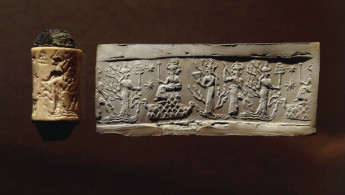US places import restrictions to protect Syrian artefacts
US Custom’s and Border Protection, the Department of Homeland Security and the Treasury Department placed the ban on artefacts crossing into US borders from Syria after years of Islamic State mayhem ravaged ancient archaeological sites across both Syria and Iraq.
"These import restrictions are intended to reduce the incentive for pillage to better preserve Syria's cultural heritage and to combat profiting from the sale of these artefacts by terrorists and criminal organisations," the US State Department said.
They include objects of stone, metal, ceramic, clay and faience objects, wood, glass, ivory, bone and shell, plaster and stucco, textile, parchment, paper and leather, paintings and drawings, mosaic and writing, that have been “unlawfully removed” from Syria since the conflict erupted in March 2011.
"Preserving the cultural heritage of Syria will be a vital component in shaping a future for the country based on reconstruction, reconciliation and building civil society."
 |
Preserving the cultural heritage of Syria will be a vital component in shaping a future for the country based on reconstruction, reconciliation and building civil society |  |
The militant group, which adopts a strict interpretation of Islam, deems statues and shrines blasphemous and regularly destroys artefacts.
Several monuments in Syria’s Palmyra, including temples, were both destroyed and pillaged by IS before Syrian forces recaptured the ancient city in May, prompting international outrage.
However, a top German archaeologist accused the Syrian regime forces of looting the Palmyra.
Speaking to the media, Parzinger said that Syrian troops, when they are off-duty, "are conducting illegal excavations" and "have looted" at the UNESCO World Heritage site.
UNESCO chief Irina Bokova, writing in the Tagesspiegel daily, wrote that "two-thirds of the old town of Aleppo have been bombed and burned" and at other sites, gangs have looted on an "industrial scale".
"Archaeological sites are in the crossfire... and being misused as military bases," she wrote, while "Palmyra, which had long been insufficiently protected, has experienced indescribable horror and destruction" under IS control.
Between 2014 and 2015, Syria's antiquities department moved some 300,000 objects and thousands of manuscripts from across Syria into storage in Damascus.





 Follow the Middle East's top stories in English at The New Arab on Google News
Follow the Middle East's top stories in English at The New Arab on Google News
![Israeli forces ordered bombed Gaza's Jabalia, ordering residents to leave [Getty]](/sites/default/files/styles/image_330x185/public/2176418030.jpeg?h=a5f2f23a&itok=_YGZaP1z)

